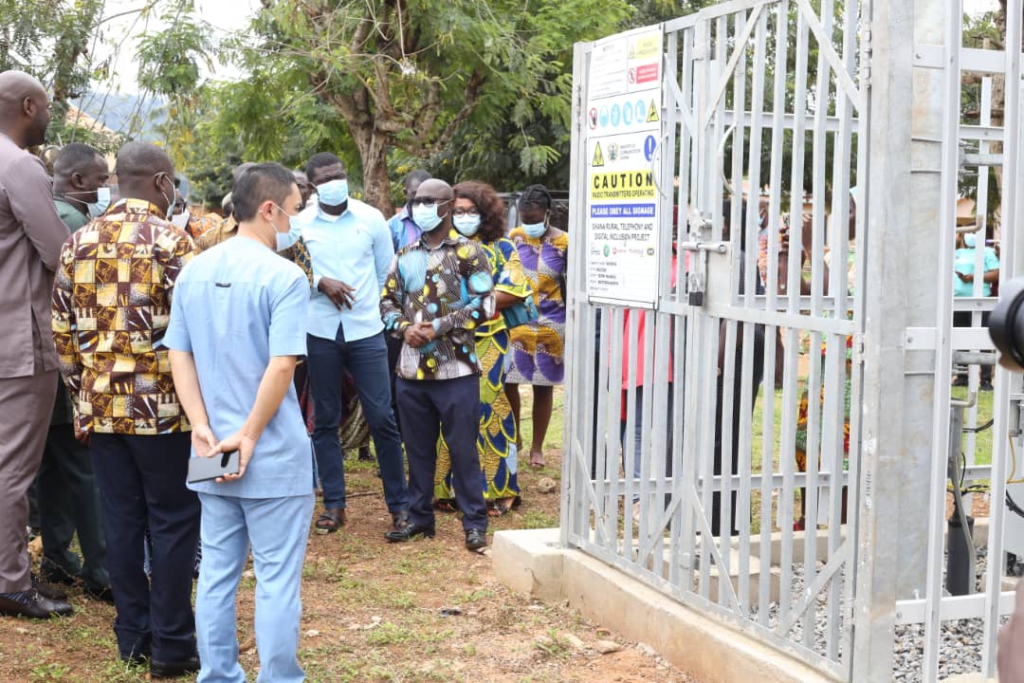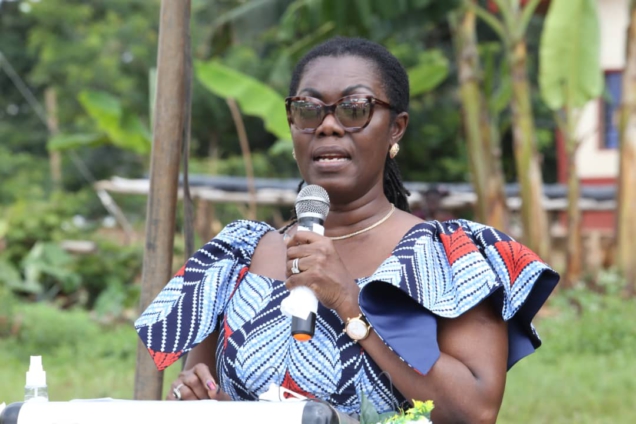GIFEC funded ICT Lab commissioned in Western North
The Communications and Digitilisation Minister, Ursula Owusu-Ekuful has commissioned a fully-furnished Information and Communication Technology (ICT) laboratory for the Sefwi-Waiwso Senior High School in the Waiwso Municipality of the Western North Region.
The laboratory, which has 40 new desktop computers with accessories, was funded by the Ghana Investment for Electronic Communications (GIFEC) and aims at providing ICT opportunities to schools as part of the efforts to bridge the digital gap in the country.
Mrs. Owusu-Ekuful said the government was committed to equipping young people with the skills they needed to succeed in life, considering the current technological revolution, emphasizing the critical role technology plays in our digital world, hence the need for all to be ICT literate.
She commended Dr. Kwaku Afriyie, the MP for the area, and other prominent indigenes of Waiwso for their role in making the project a reality.
She also advised the students to use the laboratory profitably, especially for research, to be abreast with current technological advancements.
“The government was committed to providing students with the right skills, devices and training to compete favourably with their peers in other countries” she said.
Administrator of GIFEC, Prince Ofosu Sefah, said the significant role of ICT in development could not be over-emphasized and commended President Nana Akufo-Addo for ensuring that school children acquired the relevant skills to make them functional in our knowledge society
Mr. Sefah said GIFEC was facilitating teaching and learning of ICT in basic and Senior High Schools through the deployment of ICT equipment and internet facilities.
"We are doing this with the school connectivity project, through which desktops, printers and scanners are being provided for over 1,020 schools across the country."
Mr. Sefah said 26 Basic and Senior High schools have benefited from the project in the Western North Region and more than 7000 persons, including teachers, students, artisans, head porters and identifiable women groups had been trained in basic ICT skills in the region.
Benjamin Ballow, the Assistant Headmaster of the School, which was established in 1961, now had a student population of 1,877, with 79 teaching and 39 non-teaching staff.

He expressed gratitude to the government and prayed it continued to assist the school to cater for the increasing enrolment due to the Free Senior High School Policy.
Mr. Ballow said the school offered ICT as an elective subject; hence the facility would help teaching and learning of the subject and called on other organisations for support.
The Minister also inspected works on the government of Ghana Funded Ghana Rural Telephony and Digital Inclusion Project, at Abrabra and Nkyonya, as part of her tour of GIFEC project sites within the Sefwi Wiawso Municipality of the Western North Region.
She also commissioned a Rural Telephony Project site at Mile 3, in the same district. The Rural Telephony Project is implemented by GIFEC in partnership with Huawei and Mobile Network Operators ((MNOs) through a Tripartite Partnership Arrangement, which offers a significant reduction in Cost of Ownership and Maintenance by as much as 70%.
The project seeks to provide telecommunications infrastructure and service to communities where MNOs are unable to deploy due to economic or other constraints.
As part of her tour, the Minister, together with her delegation paid a courtesy call on the Paramount Chief of Sefwi Wiawso, where she indicated that she's been sent to the region by the President, Nana Addo Dankwa Akuffo Addo to get first-hand information on the Ghana Rural Telephony and Digital Inclusion project and also visit the training centers of the Girls-in-ICT project.
She briefed the paramountcy on the Girls in ICT programme ongoing in the region adding, 900 girls have so far benefited from the training with 100 from Prestea Huni-Valley.
She noted that the first 100 girls will be given laptops and others benefit from ICT labs.
She said the ministry aims at expanding the rural telephony project to the various underserved communities.
"We will see to it that rural areas without networks are connected. Without network, one cannot take part in the digital activities.”
Latest Stories
-
Managing Prediabetes with the Help of a Dietitian
14 mins -
Joy FM listeners criticise Achiase Commanding Officer’s election comment
35 mins -
Legal Aid Commission employees threaten strike over poor working conditions
37 mins -
Ghana ranked 7th globally as biggest beneficiary of World Bank funding
47 mins -
IMF board to disburse $360m to Ghana in December after third review
51 mins -
Former Bono Regional NPP organiser donates 13 motorbikes to 12 constituencies
57 mins -
Securities industry: Assets under management estimated at GH¢81.7bn in quarter 3, 2024
1 hour -
Gold Fields Ghana Foundation challenges graduates to maximise benefits of community apprenticeship programme
3 hours -
GBC accuses Deputy Information Minister Sylvester Tetteh of demolishing its bungalow illegally
3 hours -
Boost for education as government commissions 80 projects
3 hours -
NAPO commissions library to honour Atta-Mills’ memory
3 hours -
OmniBSIC Bank champions health and wellness with thriving community walk
3 hours -
Kora Wearables unveils Neo: The Ultimate Smartwatch for Ghana’s tech-savvy and health-conscious users
3 hours -
NDC supports Dampare’s ‘no guns at polling stations’ directive
3 hours -
Police officer interdicted after video of assault goes viral
4 hours

